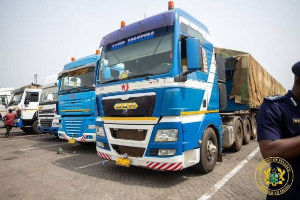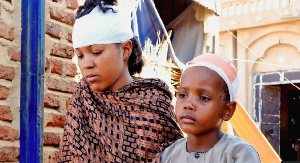Addressing the Challenges of Food Security and Climate Change through the FMNR Technology
Feature By Samuel Adadi Akapule
( CHILDREN EATING WILD FRUITS FROM FARMER MANAGED NATURAL REGENERATION TECHNOLOGY )
“Our crops yields have increased tremendously than before due to the adoption of the FMNR technology. Look, now our animals are also fatter than before and we are able to get good sales from them than before due to the availability of fodder for them to feed on. Many people are now going into animal rearing and this is leading to the improvement of the wellbeing of families particularly our children than before. Again we are able to get medicinal plants from the FMNR. We able to thatch f to roof our houses and medicinal plants” We thank World Vision Ghana for that. ”, Mr. Samuel Batan, the Secretary of the FMNR of Yameriga told the 12 Member team from East Africa who have head of the good results of the FMNR and visited the WVG Talensi Area Development Programme to learn the technology .
The above narrated scenario by the community members at Yameriga . Namolgo , Tongo-Beo, Yindure, and Wakii are among some of the numerous benefits that could be accrued from the FMNR technology.
“Also before the intervention of the FMNR we used to travel very far disnatces into the bush to pick Shea nuts for Sheabutter processing, which make us spend a lot of time and energy, but now as a result of the FMNR we are able to pick Sheanuts which are very closer to us. Many of us now are able to go into large scale of sheabutter processing and this has empowered us to take good care of our children by paying their school fees, buying educational materials for them as well as paying for their National Health Insurance Scheme.” Mrs. Atikolgma Asaadog, a 40-year old woman also remarked.
There is no doubt that the issue of food security and climate change is becoming a major challenge to most African countries of which Ghana is not exceptional. In Ghana research had shown that the Northern, Upper East and Upper West Regions are the most affected when it comes to the challenges of food security and climate challenges.
Also when it comes to the issue of food security and climate change , women and children are the most vulnerable. The Famer Managed Natural Regeneration concept is tool to addressing food security and climate change . In Ghana the concept had been tried and tested in the Talensi District of the Upper East Region by World Vision Ghana, an NGO which focuses on the wellbeing of children and women. Based on the success story, World Vision Ghana had extended the concept in all its operational areas in the Bawku West, the Garu-Tempane , Kassena-Nankana West Districts . The concept had also been tested and proved good results in Niegbouring countries like- Burkina Faso , Niger and Mali among others . The Telensi ADP has now become the centre of excellence for the learning of the FMNR . In 2014 , a 12 member team from East Africa visited the area to learn the technology and to go back and improve upon the implementation process of the FMNR which the stated not long ago
THE BACGROUND OF FMNR CONCEPT
The basic method of the FMNR is that the farmer selects the stumps or shrubs he or she will utilize, and decides how many stems will be allowed to grow on each stump, based on the farmer’s needs and ultimate purpose for reforestation.
Excess stems are then cut, and side branches pruned off up to half way the trunk. A good farmer will then return two to six months for touch-up pruning, and thereby stimulate faster growth rates and produce straighter stems.
There is no set system or hard and fast rules for the FMNR. Farmers are given guidelines, but are free to choose the number of stumps per hectare and stems per stump to leave, and the time span between subsequent pruning and harvest of stems and the method of pruning.
Literature available indicates that countries like Mali, Burkina Faso, Niger, Senegal and Chad, which experienced desertification some years back, the adoption and practice of the FMNR concept has saved the situation, thus improving upon the living standards of the people
BEFORE THE INTEVENTION OF THE THE CONCEPT IN TALENSI DISTRICT
Speaking to the GNA about the genesis of the FMNR in the District, the Talensi Area Development Programmes Manager (ADP) of World Vision Ghana, Mr. Frederick Amoabeng told the GNA that what informed WVG’s decision to empower the people particularly famers to adopt the concept was informed by the high incidence of food insecurity and climate change challenges in the area at that time.
“At that period in question crop yields had declined along with soil fertility, Lack of fodder for animals particularly cattle , sheep and goats in the dry seasons as the area is completely burnt , Wind speeds had increased , Wildlife and bush land had disappeared , Climatic conditions had become more severe and bushfires were common dry season occurrence and most people thought nothing could be done to reverse the situation. This prompted WVG to begin the implementation of the project in the Talensi District in 2009 with technical support from Tony Ranao an expert in FMNR and the Forestry Division ”, he recounted. .
IMPACT OF THE PROJECT IMPLEMENTATION
The ADP Manager indicated after building the capacity of the farmers on the technology, they adopted it which led to the enormous benefits including the reclaiming of degraded land, increase of soil fertility leading to food security and the improvement of climate change conditions.
He mentioned that although the project was in second phase, a lot of significant impact had been made, especially in the area of the improvement of the wellbeing of children and women which, he noted , was a cardinal principle of WVG.
He indicated that apart from the Talensi ADP where the project started and making most of the communities to become forested and Centre of excellence for learning the concept , his outfit and the donors are happy that the project had contributed to the improvement of food security and climate change conditions.,
“FMNR practices have generated more wild fruits and food for consumption. Children are now able to access fruits to eat on the way to and from school from FMNR fields. Children are well nourished. Contented stomach is certainly better for concentration in class. More boys who were used as shepherds and made to stay away from school due to lack of fodder are mow in school. More boys are in school now due to the availability fodder. Crop yields have increased due to the increase of the soil fertility as a result of the droppings of the residues of the FMNR. Framers now get fatter animals than before due to the availability of fodder resulting in higher market prizes”, he indicated..
On the general wellbeing of family and the communities , he said the recovered forest areas give a better access to herbal medicines, in terms of availability and shorter proximity . He indicated that the FMNR re-growth trees protect fields and houses and schools from severe wind storms as well as provide better shade, beauty and comfort of the community’s surroundings.
It also provides Fuel wood, indigenous roofing materials , the return and retention of e.ndangered species as well as promote social cohesion and unity among the people since the project creates avenues for people to work together to achieve a common goal
Strategies for the Successful implementation of the project
The Manager of WVG in charge of the FMNR , Mr Samuel Abasiba , mentioned the Village Saving and Loans Associations, Bee Keeping , Goats and Rabbits rearing , Acacia and maize farming as some of the alternative livelihoods measures that took away people from engaging in the destruction of the FMNR and causing environmental degradation .
The capacity building, the training community fire volunteers and the commitment from the Chiefs , opinion leaders and Assembly members, District Assembly, Ministry of Food and Agriculture , the National Fire Service and National District Management Organization among others also contributed to the success story,
CONCLUSION
Government and for that matter the Savannah Accelerated Development Authority (SADA), the Ministry of Food and Agriculture , the Ministry of Environment, Science and Technology , traditional authorizes and other partners should partner with WVG to see how the technology could be implemented in the remaining parts of the country to help improve upon Food Security and Climate Change .
Notwithstanding the fact that bush fires in some of the communities remained a major challenge to the FMNR, there is the urgent need to extend its implementation to the rest of the country where it is not practiced, particularly in the Northern, Upper East and Upper West Regions to help address the issue of Food Security and Climate Change.
END
Opinions of Thursday, 21 May 2015
Columnist: Akapule, Samuel Adadi














